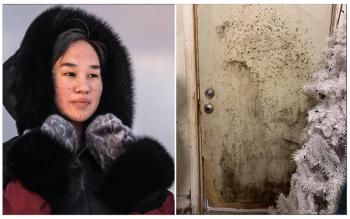Image Caption
Summary
Local Journalism Initiative Reporter
Windspeaker.com
Nunavut MP Mumilaaq Qaqqaq is working against unsafe and unhealthy living conditions in her territory, and challenges the federal government to step up with concrete action to address concerns.
“It’s astonishing what people [in Nunavut] don’t have that southerners take for granted,” Qaqqaq said in an interview with Windspeaker.com. “It’s for some reason OK that we don’t feed the hungry and clothe the poor.”
Qaqqaq says the federal government has failed to provide adequate housing in Nunavut, a problem that has persisted throughout the territory’s history since its creation in 1999.
The territory’s population is primarily Indigenous. The 2016 census reported just under 86 per cent of the population identify as Aboriginal, with the overwhelming majority as Inuit.
“Never do we see the federal government do things for Indigenous people unless there’s national or international pressure,” Qaqqaq said, a member of the NDP caucus.
Qaqqaq has spent her time traveling back and forth between Ottawa and the territory since being elected, with part of her work dedicated to identifying and amplifying issues related to housing.
Much of Qaqqaq’s in-riding work involves highlighting real-life experiences and sharing them on social media in the hope of creating awareness of what the day-to-day lives of Nunavut residents are like.
“To put it in very simple terms, I'm hoping to find support and people to be mad with us,” Qaqqaq said. “We need to practice being more human, and being more caring and supportive.”
One constant that relates to housing deficiencies in Nunavut is the overcrowding in the living options available. Qaqqaq said that many of the social housing developments consist of only one or two bedroom apartments, which are insufficient for larger families.
“I’ve been to so many communities where people say ‘throw those away... those are too small for us’,” she said.
A report by the Nunavut Housing Corporation compiled in 2016 for the Standing Senate Committee on Aboriginal Peoples stated that 38 per cent of Nunavummiut live in social housing, 80 per cent of social housing tenants make less than $23,000 per year, and 38 per cent of those tenants live in overcrowded homes.
Additionally, Qaqqaq says that about one-third of people in Nunavut have mould in their residences.
“I don’t know how else to explain it other than people are living in mould boxes,” Qaqqaq said. “Some places I was sneezing so much after a few minutes of being in there. I couldn’t imagine the long-term effects that that has on people.”
It is not uncommon for health problems to develop under these conditions, such as skin irritations and rashes.
“Could you imagine having to live with that on your skin because of the home you’re in?” Qaqqaq said.
Health Canada considers indoor mould growth to be a significant health hazard, with potential symptoms including eye, nose and throat irritation, coughing and phlegm build-up, wheezing and shortness of breath, and worsening of asthma symptoms.
Qaqqaq also listed off examples of people being stuck in abusive households and dire living situations that can exacerbate or contribute to mental health issues.
“The fed govt directly creates hopelessness by under funding the territory which results in death, suicide and murder”, tweeted Qaqqaq earlier this week. “Nunavut would not have the highest suicide rate in the country if we were provided adequate housing as the federal government should be providing,” she added in a follow-up tweet.
Due to the high costs of construction in the North, most private companies tend to avoid building development unless subsidized by the federal government. The 2016 Nunavut Housing Corporation report states that, on average, construction costs are three times higher in Nunavut than in the Greater Toronto Area.
Qaqqaq said she’s never seen a federal government provide proper opportunities for Inuit in Nunavut.
“Since the day I was born, Inuit have heard promises of a good life, of positivity, of being able to contribute to society in a healthy way, of having basic human rights and we continue to have those promises broken,” Qaqqaq said in a recent news release following her response to the Throne Speech.
Qaqqaq challenges people concerned about the housing situation in Nunavut to educate themselves on the backstory behind government policies and actions that have repeatedly overlooked or discriminated against Canada’s Indigenous population.
“Situations aren’t just the way they are for no reason,” she said. “There’s a history for everything.”
Local Journalism Initiative Reporters are supported by a financial contribution made by the Government of Canada.

